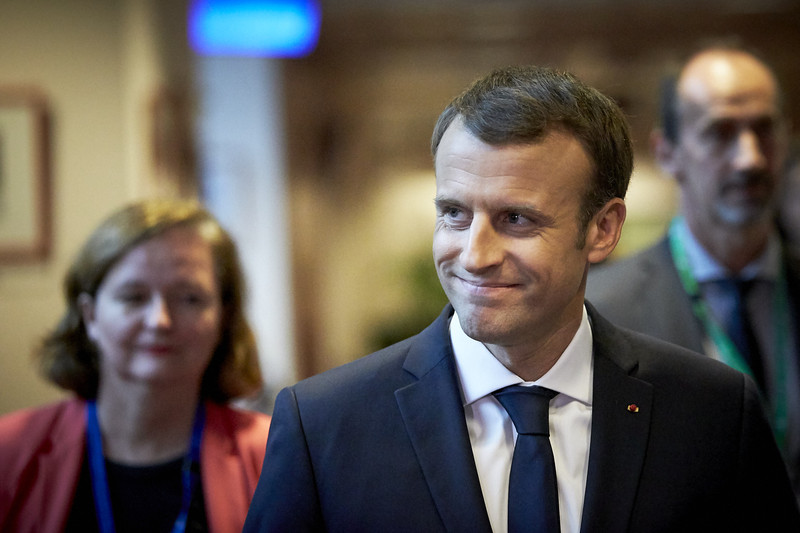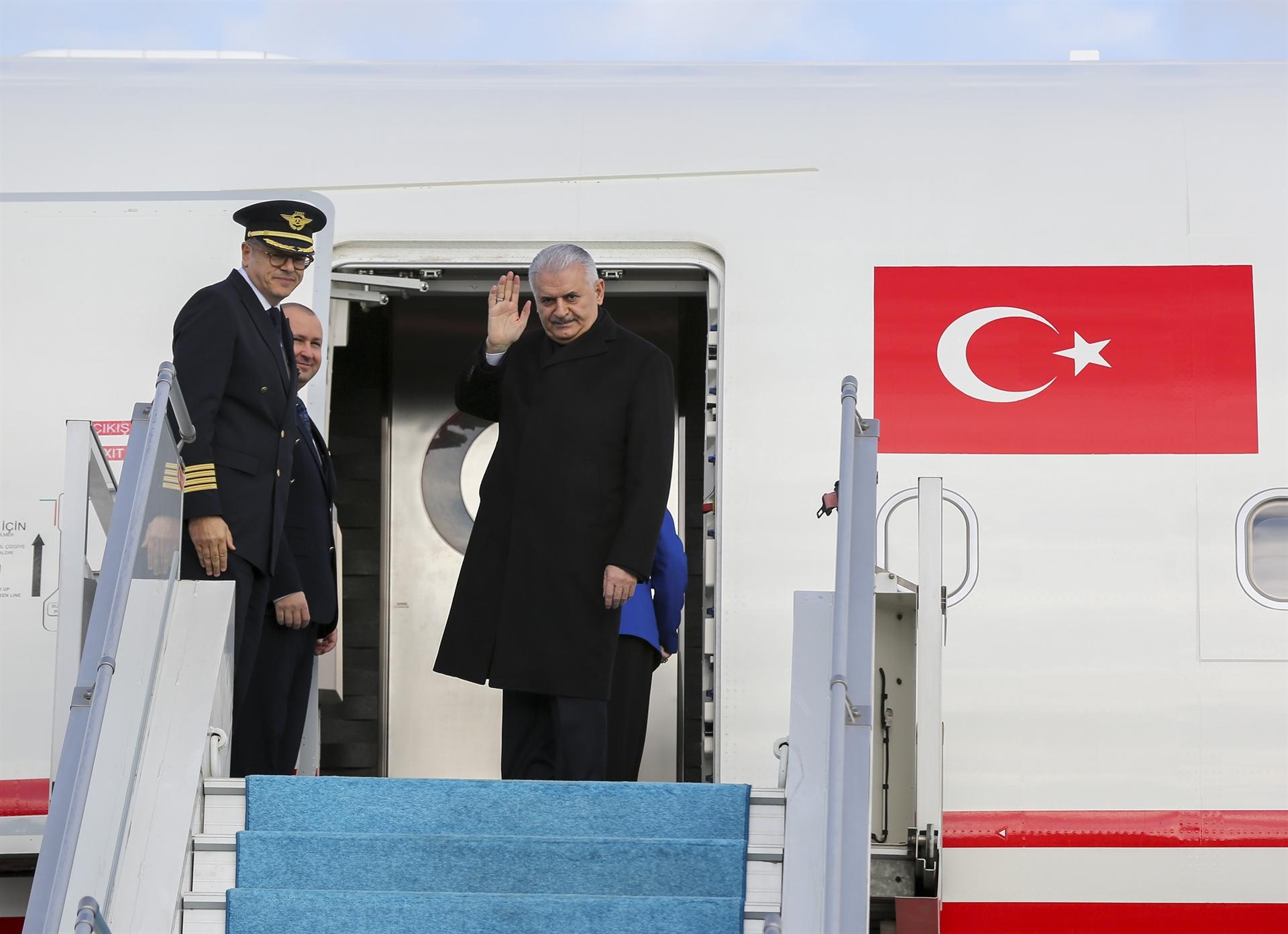
EU Observer (14 March 2018)
Macron will open the process in Strasbourg on 17 April. He first launched the idealast September in speeches in Athens, and at the Sorbonne University.
All EU countries - except Hungary and the departing UK - have joined the initiative and will also organise meetings and debates until October.
"It is no more just a 'French' initiative," Loiseau noted.
She admitted that "it took time until people realised we were seriously considering organising [debates] in France and seriously inviting member states to join the movement".
"We convinced member states that the status quo was much more dangerous than risking remarks, criticisms and proposals," she said.
At first, Macron talked about "democratic conventions", but the word was too reminiscent of the Convention on the Future of Europe, which prepared the EU constitution that failed in referendums in France and the Netherlands in 2005.
Macron's consultations, in France and other countries, will consist of debates organised by local authorities, and other actors like companies, trade unions, NGOs, universities or high schools.
"It has to come from the bottom," said Loiseau.
Ahead of the kick-off event in Strasbourg, a panel of European citizens is expected to "decide the items which will be debated, to avoid a decision taken by authorities," Loiseau said. The idea is still discussed by member states and the European Commission.
The French minister noted that consultations will differ from one country to another because of "cultural differences", but that there will be a "common methodology".
A working group is already in place in Brussels to coordinate the process.
"We share the same idea of pluralism, trans-partisanship, transparency and a capacity to draw lessons from the results of the consultations," she said.
She explained that at least in France, organisers of consultations will be asked to sign "a short charter, in which they accept the demand for transparency - who comes, who talks, who are the participants, who pays."
They will also commit to summarise and publish the outcome of the debates.
Non-committal 'consultations'
At the end of the consultation, in October, summaries will be processed in order to give EU leaders "a number of results to work on" at their summit in December.
"We are thinking of organising something both at national and European level to make sure all voices are heard before we take this material to the European Council," the minister said.
She added that while leaders will commit to take citizens' remarks and demands into consideration, they will "not implement everything that has been proposed."
"This is non-committal to the extent that there are going to be a vast arrays of ideas," she said.
She noted that "some will be contradictory, some might be controversial, but it's food for thought and it is a material for decision."
For Macron and other EU leaders, the point of the consultations is to "give back their say to the EU citizens."
"We want to ask them what they want for the future of Europe, what they appreciate, what they don't like in the functioning of the EU and what are their proposals," she said. "There are high expectations on Europe and a deep need for transformation of the European Union as it currently works."
In the last 15 years, French and Dutch voters rejected the EU constitution, the Irish voted against the Lisbon treaty before accepting a revised version, and the UK voted to leave the EU.
"Clever reforms drafted by clever people" and followed by referendums don't work anymore, Loiseau pointed out.
"It is something that has proven wrong, especially because we ask people to answer by Yes or No to a series of questions and a complexity of issues," she said.
Ahead of the European elections next year - a vote usually marked by low turnout - Macron and other EU leaders hope to get more people interested and involved in discussions over the future of the bloc.
Citizens' priorities
"Usually you have the hard believers, who are militants of Europe, and you have vocal eurosceptics who tend to consider themselves as the voice of the people," Loiseau noted about the audience of EU debates.
She insisted that there was "a vast majority of citizens throughout Europe who don't express their views on EU and who don't even go to the polls when it comes to EU elections."
"We want to reach out to people from all professions, young and old, people from big cities and remote areas," she said.
At the time when the consultations reports reach the leaders' table, EU member states will be engaged in tricky negotiations about the EU budget for 2020-2027.
"It will be very helpful to have these feedbacks," Loiseau argued. "What are priorities, where do people want European taxpayers' money to go?"
"We have to take the risk of seeing priorities which we have not foreseen coming strong on the agenda, or other priorities which seem important to heads of state and government appearing to be more superficial for citizens," she noted.
For the minister, the exercise could also be "an opportunity to clarify what the EU does and what the EU does not, what it should do and maybe what it should stop doing."
She insisted that it was "important to make clear to the citizens that absence of satisfaction comes from the absence of competence of the EU."
With the consultations, Macron also intends to frame the campaign ahead for the European elections.
Macron's new march?
The process will end in October, just before European parties finalise their platform and choose their lead candidates.
Loiseau said that the French government did not want to "mix with the preparation of the European elections".
She added however that "results will be made public, so every political party will be able to take advantage of the results of the consultations, knowing what the people have in mind."
In 2016, a new political movement in France, called En Marche, launched a large-scale survey of people's concerns and expectations.
The results, processed through algorithms and human expertise, became the basis for the presidential campaign of En Marche leader, a newcomer called Emmanuel Macron.
Does he intend to repeat the operation, and launch his own European movement based on the citizens' consultations?
Loiseau only answered that "there will be a list representing the presidential majority in France, running for the European elections."
"I'm certain they will be interested in the results of the citizens' consultations," she added. "But it is also available for other political parties."
No comments yet.
- IRISH PRECEDENT MAY HALT EU EXTRADITIONS TO POLAND Europe - EU 14.03.2018
- CHEMICAL WEAPONS WATCHDOG SAYS IRAQ ELIMINATED ARMS STOCK Iraq 14.03.2018
-
 TURKISH PM STARTS TWO-DAY AZERBAIJAN VISIT
The Caucasus and Turkish-Armenian Relations
14.03.2018
TURKISH PM STARTS TWO-DAY AZERBAIJAN VISIT
The Caucasus and Turkish-Armenian Relations
14.03.2018
- MONGOLIA, AZERBAIJAN DISCUSS COOPERATION OPPORTUNITIES UNDER BELT&ROAD The Caucasus and Turkish-Armenian Relations 14.03.2018
- VIETNAM CENTRAL BANK SEEKS TO LOWER COMMERCIAL RATES Asia - Pacific 14.03.2018
-
25.01.2016
THE ARMENIAN QUESTION - BASIC KNOWLEDGE AND DOCUMENTATION -
12.06.2024
THE TRUTH WILL OUT -
27.03.2023
RADİKAL ERMENİ UNSURLARCA GERÇEKLEŞTİRİLEN MEZALİMLER VE VANDALİZM -
17.03.2023
PATRIOTISM PERVERTED -
23.02.2023
MEN ARE LIKE THAT -
03.02.2023
BAKÜ-TİFLİS-CEYHAN BORU HATTININ YAŞANAN TARİHİ -
16.12.2022
INTERNATIONAL SCHOLARS ON THE EVENTS OF 1915 -
07.12.2022
FAKE PHOTOS AND THE ARMENIAN PROPAGANDA -
07.12.2022
ERMENİ PROPAGANDASI VE SAHTE RESİMLER -
01.01.2022
A Letter From Japan - Strategically Mum: The Silence of the Armenians -
01.01.2022
Japonya'dan Bir Mektup - Stratejik Suskunluk: Ermenilerin Sessizliği -
03.06.2020
Anastas Mikoyan: Confessions of an Armenian Bolshevik -
08.04.2020
Sovyet Sonrası Ukrayna’da Devlet, Toplum ve Siyaset - Değişen Dinamikler, Dönüşen Kimlikler -
12.06.2018
Ermeni Sorunuyla İlgili İngiliz Belgeleri (1912-1923) - British Documents on Armenian Question (1912-1923) -
02.12.2016
Turkish-Russian Academics: A Historical Study on the Caucasus -
01.07.2016
Gürcistan'daki Müslüman Topluluklar: Azınlık Hakları, Kimlik, Siyaset -
10.03.2016
Armenian Diaspora: Diaspora, State and the Imagination of the Republic of Armenia -
24.01.2016
ERMENİ SORUNU - TEMEL BİLGİ VE BELGELER (2. BASKI)
-
AVİM Conference Hall 24.01.2023
CONFERENCE TITLED “HUNGARY’S PERSPECTIVES ON THE TURKIC WORLD"









